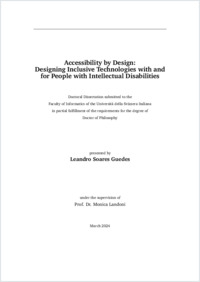Accessibility by design : designing inclusive technologies with and for people with intellectual disabilities
- Soares Guedes, Leandro
- Landoni, Monica (Degree supervisor)
- 2024
PhD: Università della Svizzera italiana
Accessibility
Assistive technologies
Inclusion
Interaction
People with intellectual disabilities
Co-design
Informal learning
Museums
Creativity
Multisensory experiences
English
Digital accessibility and assistive technologies have been employed to improve the experiences of individuals with intellectual disabilities in multiple settings. This work explores the application of these technologies in informal learning settings, with an emphasis on museums and creativity, to create engaging and knowledge-rich experiences. In this doctoral dissertation, participants with intellectual disabilities are engaged in all design steps, with the final goal of understanding their needs and preferences and developing and evaluating prototypes with them. When establishing procedures and activities to engage them in the co-design process, it is essential to consider their abilities, needs, and rights. The study is structured into four main parts: (1) Methodological Frameworks and Design, which underscores the use of improvisation and scaffolding techniques to adapt the design process to the participants' requirements; (2) Digital and Interactive Technologies, examining the role of Augmented Reality (AR) through AIMuseum, accessible applications through ACCESS+, and social robots in making museum content more understandable and engaging for the participants; (3) Creativity and Multisensory Integration, enabling users to interact with art content using multiple senses and leveraging their creative expression with Artificial Intelligence (AI), a Multisensory Diorama (MSD), and with a multisensory self-representation box, called Empowerbox, fostering self-expression and creativity; (4) Discussion and Conclusions, where research questions are addressed and reflections are offered. In these studies, we included important stakeholders: cultural mediators, who play an essential role in building narratives to engage visitors while describing the content of items on display; educators and support workers, who have close contact and provide help and the necessary scaffolding for participants; and a psychologist, who analyze emotional, cognitive and social processes and behavior. These stakeholders are also involved in the design team, and by examining their participation, interaction, and role, this project seeks to better understand the needs of final users and find more effective ways to listen to their voices and have them as active partners. This doctoral dissertation contributes to the Human-Computer Interaction (HCI) field by providing methodological insights and practical applications for inclusivity in technology design. Also, it advances the understanding of how digital and interactive technologies can be leveraged to make informal learning and cultural institutions more accessible and engaging for individuals with intellectual disabilities.
- Collections
- Language
-
- English
- Classification
- Computer science and technology
- License
-
License undefined
- Open access status
- green
- Identifiers
-
- NDP-USI 2024INF005
- ARK ark:/12658/srd1328319
- URN urn:nbn:ch:rero-006-121985
- Persistent URL
- https://n2t.net/ark:/12658/srd1328319
Statistics
Document views: 1881
File downloads:
- 2024INF005: 778
